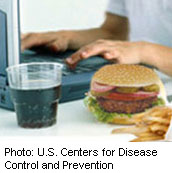
THURSDAY, May 22, 2014 (HealthDay News) — Cheaper food could be a major cause of the obesity epidemic in the United States, according to a new study.
The study also found that it’s an epidemic that is hitting all Americans, not just certain groups.
“Not only has food been getting cheaper, but it is easier to acquire and easier to prepare,” Roland Sturm, lead author of the report and a senior economist at RAND, a nonprofit research organization, said in the group’s news release.
“It’s not just that we may be eating more high-calorie food, but we are eating more of all types of food,” he said.
Sturm wrote the new data review along with Ruopeng An, of the University of Illinois at Urbana-Champaign. They wrote that “Americans are spending a smaller share of their income (or corresponding amount of effort) on food than any other society in history or anywhere else in the world, yet get more for it.”
In the 1930s, Americans spent one-quarter of their disposable income on food. That fell to one-fifth in the 1950s, and currently is less than one-tenth of disposable income, the researchers noted.
Some common notions about the causes of obesity seem to be cast in doubt by the new research. They include theories such as Americans becoming fatter because they find fresh fruits and vegetables tougher to obtain; that exercise rates are falling; and that many Americans lack the time to exercise and eat better.
However, the RAND review found that rising obesity rates in the United States coincided with a rise in the availability of fruits and vegetables, as well as a rise in people exercising and having more leisure time.
So why are Americans still piling on excess pounds? The fact that Americans have the cheapest food available in history is likely the reason, the researchers said.
Many factors have been suggested as reasons for the steady climb in obesity rates over the past several decades, leading to the current situation where two in three Americans are overweight or obese. These factors include snack products and fast food, large portion sizes, vending machines, increased use of cars, and spending too much time in front of televisions and computers.
However, cheap food has the strongest link to obesity, according to the authors of the study published online May 22 in the journal CA: A Cancer Journal for Clinicians.
The RAND review also found that obesity is a growing threat to Americans everywhere, regardless of where they live or what social group they belong to.
The findings suggest that focusing on reducing calorie intake — particularly from sugar-sweetened drinks and salty snacks — might be a better way to reduce obesity rates than attempts to get Americans to eat more fruits and vegetables and get more exercise, according to the study authors.
More information
The U.S. Centers for Disease Control and Prevention explains how to achieve and maintain a healthy weight.
Copyright © 2026 HealthDay. All rights reserved.

